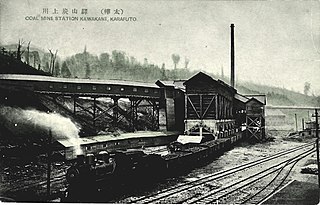 W
WThe Empire of Japan is a historical nation-state along with its colonies, protectorates, mandates, and other territories that existed from the Meiji Restoration in 1868 until the enactment of the 1947 constitution and subsequent formation of modern Japan.
 W
WKarafuto Prefecture, commonly known as South Sakhalin, was a prefecture of Japan located in Sakhalin from 1907 to 1949.
 W
WThe Chihaku ferry or was a ferry service in operation from 1923 to 1945 between Wakkanai in north Hokkaidō, Japan and Ōdomari, now Korsakov, in what was then Karafuto Prefecture, South Sakhalin. In November 1922, the Ministry of Railways extended the Sōya Main Line to Wakkanai Station. The following May, at the behest of public and private enterprise in Hokkaidō and Karafuto, the Chihaku railway connection ferry service began operations. By the time the service was abandoned in the final days of the war in August 1945, it had ferried 2,840,000 passengers. In November 1970, a monument was erected near the North Breakwater Dome in Wakkanai in its honour. Vessels on the route included the icebreakers Aniwa Maru (亜庭丸), named after Aniva Bay, from 1927, and Sōya Maru (宗谷丸), named after the Sōya Straits, from 1932.
 W
WThe East Coast Line was a railway line in Karafuto Prefecture during the days of the Empire of Japan. By 1937, it ran 95.1 kilometres (59.1 mi) from Ōdomari Port Station in what is now Korsakov to Sakaehama Station.
 W
WThe evacuation of Karafuto (Sakhalin) and the Kuriles refers to the events that took place during the Pacific theater of World War II as the Japanese population left these areas, to August 1945 in the northwest of the main islands of Japan.
 W
WThe Hōshin Line was a railway line in Karafuto Prefecture during the days of the Empire of Japan. It ran 83.8 kilometres (52.1 mi) from Toyohara Station in what was then the city of Toyohara, to Tei Station in what was then the town of Maoka.
 W
WThe Kawakami Line was a railway line in Karafuto Prefecture during the days of the Empire of Japan. It ran 21.9 kilometres (13.6 mi) from Konuma Station on the East Coast Line to Kawakami Coal Mine Station.
 W
WMoneron Island, is a small island off Sakhalin Island. It is currently administered as a part of Russia.
 W
WNanka Railway was a private railway company in Karafuto Prefecture during the days of the Empire of Japan. Founded in April 1925 as a subsidiary of Ōji Paper, the company operated the Nanka Line that ran 18.6 km (11.6 mi) from Shinba Station on the East Coast Line to Rūtaka Station in what was then the town of Rūtaka. The company also operated a network of buses connecting Rūtaka and, via Rūtaka, Honto with the prefectural capital of Toyohara and also with Ōdomari, now Korsakov, where passengers could connect with the Chihaku ferry to Wakkanai.
 W
WThe Invasion of South Sakhalin, also called the Battle of Sakhalin, was the Soviet invasion of the Japanese territorial portion of Sakhalin Island known as Karafuto Prefecture. The invasion was part of the Soviet–Japanese War, a massive campaign of the Second World War.
 W
WThe Soviet assault on Maoka was carried out at the port of Maoka, Southern Sakhalin during August 19-22, 1945, by the forces of the Soviet Northern Pacific Flotilla of the Pacific Fleet during the South Sakhalin Offensive of the Soviet–Japanese War at the end of World War II. It was the second amphibious assault on South Sakhalin, after the Soviet assault on Toro on August 16.
 W
WTyuleny Island is a small island in the Sea of Okhotsk, east of Russia's Sakhalin Island, in Northeast Asia. It is also called Kaihyo Island (海豹島).
 W
WWakkanai Karafuto Museum opened in Wakkanai, Hokkaidō, Japan in 2018. The display documents the history of Karafuto and its connections with the area and includes materials relating to the Chihaku ferry.